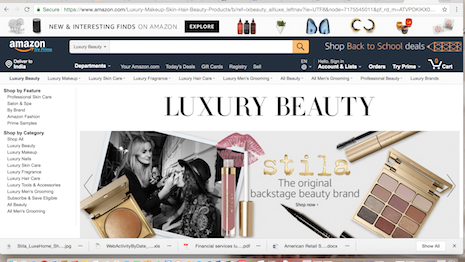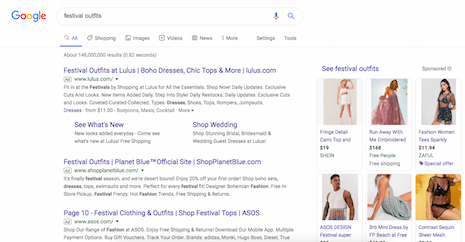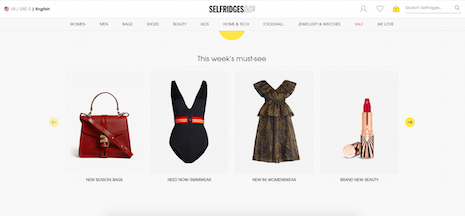 The beauty of luxury online. Image credit: Amazon
The beauty of luxury online. Image credit: Amazon
Amazon may be regarded as the biggest disrupter in retail, but luxury marketers and retailers may have a chance to attract younger consumers away from the platform based on brand values.
A new report from Wunderman Thompson reveals that despite older consumers’ loyalty to Amazon, Gen Z consumers are more likely to shop with other brands based on ethics. For all shoppers, more than half will go directly to Amazon to search for a specific product.
“Brands and retailers continue to grapple with the challenge of how to exist alongside Amazon," said Neil Stewart, global CEO of Wunderman Thompson Commerce. "While the retail giant may be a competitor, it is also a platform that can give brands and retailers enormous scope to reach millions of consumers globally.
"The most important thing is that they find a way to partner with Amazon but still own the relationship with the customer, now and into the future.”
Wunderman Thompson surveyed 15,000 consumers who shop online through the United States, the United Kingdom, France, Germany, Spain, the Czech Republic, Belgium and the Netherlands.
What drives your shopping
Fifty-one percent of consumes in the survey said they go to Google or other platforms for inspiration when shopping. But when looking for an individual product, 56 percent go right to Amazon.
Consumers use Google for shopping inspiration
Consumers stated that to purchase from a platform, brand or retailer other than Amazon they look for cheaper pricing, with 61 percent citing this as their top reason.
A more appealing rewards program follows cheaper pricing at 26 percent, and convenient delivery options are behind at 23 percent.
However, Generation Z shows motivation beyond price and convenience, pushed more so on values. One in five Gen Z consumers said they would choose another retailer over Amazon based on brand ethics.
These young shoppers are also highly interested in an in-store shopping experience, with 49 percent saying they prefer to shop with a brand that has a physical store. When looking at all consumers, that number drops to 46 percent.
When it comes to luxury, fashion and accessories and beauty, consumers as a whole look away from Amazon.
Twenty-six percent of those surveyed state they prefer sites such as Selfridges for online apparel purchases, compared to 17 percent who prefer Amazon.
Selfridges' online site
For health and beauty, 24 percent prefer retailer sites and 21 percent prefer Amazon.
Shoppers would rather buy luxury items such as high-end clothing, watches and jewelry directly from the brand’s Web site, with 21 percent citing this as their preferred method.
However, Amazon still rules over categories including entertainment, technology and home and garden.
Additional research
Younger shoppers may be interested in in-store shopping, but the bricks-and-mortar experience needs to be adapted to modern technology.
Generation Z and millennial consumers are the age groups most likely to shop at bricks-and-mortar stores, but they are also the most interested in retail stores incorporating emerging technology.
According to a study conducted by Oracle NetSuite, Wakefield Research and The Retail Doctor, baby boomers are both the least likely to shop in-store and the most likely to describe the retail environment as less inviting. They are also the least apt to be influenced by in-store technology such as virtual reality, while Gen Z shoppers are the most likely to have purchase decisions impacted by such tools (see story).
Also, while luxury shoppers are interested in purchasing directly through brand sites, these platforms need to be optimized.
As ecommerce sales of luxury goods soar, an overwhelming number of consumers remain disappointed by their experiences with online shopping, particularly when it comes to speed and efficiency.
Ninety percent of shoppers have left an ecommerce Web site because it did not load as quickly as expected, according to a report published by Yottaa based on a survey conducted by Retail Systems Research. While high quality imaging is crucial to luxury brands and retailers, slow site speed greatly impacts consumers’ user experience (see story).
“Amazon Prime is the world’s most advanced loyalty program and has completely changed what ‘good’ looks like for consumers," Mr. Stewart said. "Expectations are set incredibly high by the speed, ease and convenience of the Prime service but, rather than relying solely on replicating this model, brands and retailers need to find the areas where Amazon falls down in the eyes of consumers.
"Focus on 'What Amazon Cannot Do' (WACD) and this is where your company can compete," he said. "The future of retail is up for grabs for the companies that can tap into what customers will want from their shopping experience in five, 10 and 15 years’ time.”

